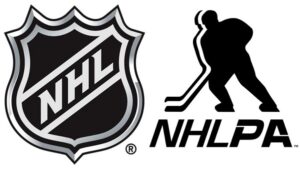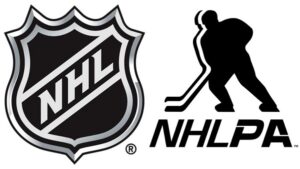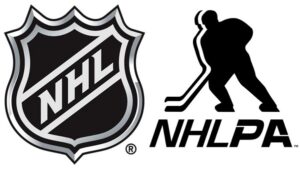Key Details For the NHL’s Proposed 2020-21 Season
Key Details For the NHL’s Proposed 2020-21 Season
The NHL and NHLPA reach a tentative agreement for the 2020-21 season. Check out the details in today’s morning coffee headlines.
TSN/SPORTSNET: reported on the tentative agreement on the 2020-21 season reached last night by the NHL and NHLPA.
 The agreement requires ratification by the league board of governors and the PA executive board. The latter verbally supported moving ahead with the agreement last night. The board of governors’ vote is expected Sunday or Monday.
The agreement requires ratification by the league board of governors and the PA executive board. The latter verbally supported moving ahead with the agreement last night. The board of governors’ vote is expected Sunday or Monday.
Here are the pertinent details:
– It will be a 56-game schedule commencing on Jan. 13. Training camps for last season’s seven non-playoff clubs will commence on Dec. 31. The other 24 teams will begin camp on Jan. 3. There won’t be exhibition games.
– The regular season would tentatively end on May 8. The Stanley Cup playoffs would end by the first week of July.
All dates are subject to change.
– The proposed divisions break down as follows:
Calgary, Edmonton, Montreal, Ottawa, Toronto, Vancouver and Winnipeg,
Boston, Buffalo, New Jersey, New York Islanders, New York Rangers, Philadelphia, Pittsburgh and Washington,
Carolina, Chicago, Columbus, Dallas, Detroit, Florida, Nashville and Tampa Bay,
Anaheim, Arizona, Colorado, Los Angeles, Minnesota, San Jose, St. Louis and Vegas.
– Each division will produce four playoff teams. The postseason will be inter-division with each division winner becoming Stanley Cup semifinalists seeded by regular-season points.
– The tentative plan is for every team to play in their home arenas this season instead of playing in hub cities, though the latter remains a possibility.
– A player can opt-out from this season if he or an immediate family member is considered part of a high-risk category. That player will not be paid for this season and his team will have the option of carrying over his contract for one year.
– Rosters will be capped at 23 players with the salary cap at $81.5 million. Players on one-way NHL contracts will not have their salaries prorated. Those in the AHL on two-way contracts will have prorated salaries based on how many games are played in that league, with a 40 percent minimum salary payout.
– Teams will be permitted to carry four-to-six extra players (taxi squad), including a mandatory third goaltender. Those players will practice and travel with the team. For salary cap purposes, those extra players will be treated as AHL call-ups. Players will have to clear waivers to be put on the taxi squad. Players on that squad will be paid an AHL salary if on a two-way contract.
– As part of the NHL’s COVID-19 protocols, players will be tested every other day, possibly every day, and will be expected to have minimal outside contact. Charter planes will be used for all travel and health standards at road hotels and restaurants strictly monitored. Players will be confined to the rink and the hotel.
– The fate of the proposed Canadian Division rests with the five health authorities in Alberta, British Columbia, Manitoba, Ontario and Quebec. The league and the seven Canadian teams are in ongoing discussions with those provincial and regional authorities.
It’s believed the biggest sticking point is whether NHL players will be subject to intra-provincial travel quarantine restrictions. Failing that, the Canadian teams could play in a hub city like Edmonton or spend the season in the United States.
SPECTOR’S NOTE: The proposed agreement is expected to be rubber-stamped by the BoG and the PA executive. We’ll likely learn more details in the coming days. Much will depend, of course, on whether the five provincial health authorities sign off on the plan of an all-Canadian division. Some reports cited sources expressing confidence that agreement will be reached. We’ll find out soon enough.
The fate of the seven Canadian teams will determine most of those aforementioned dates and the divisional realignments. Those could change if those clubs are forced to spend the season playing in the United States.
Understandably, that’s the last option for the league and those clubs, whose players won’t be thrilled about potentially spending at least five months living in hotels away from their families. They also probably wouldn’t be happy about playing in a hub city in Canada but at least they could have the opportunity to travel back to their NHL cities to see their families.
A Canadian team would be guaranteed a spot as a Stanley Cup semifinalist under the proposed playoff format for the season.
It’ll be interesting to see how many players opt-out of this season. Only a handful did so during the 2020 playoffs. Going any entire season without a paycheck will be a strong enticement to suit up.
The latest on the NHL efforts to open the 2020-21 season on Jan. 13 in today’s morning coffee headlines.
TSN: Pierre LeBrun reports negotiations are continuing between the NHL and NHLPA on an agreement for the 2020-21 season to put to a vote by their respective sides by perhaps the end of next week. Ratification is needed as soon as possible for players on last season’s seven non-playoff clubs that require 14-day quarantines before joining their clubs in training camp on Dec. 31.
 Darren Dreger indicates everyone involved in the process remains hopeful. However, there are club executives, general managers and players agents who are skeptical this can be accomplished for a Jan. 13 puck drop because of the work that still needs to be done.
Darren Dreger indicates everyone involved in the process remains hopeful. However, there are club executives, general managers and players agents who are skeptical this can be accomplished for a Jan. 13 puck drop because of the work that still needs to be done.
Frank Seravalli noted there are as many as four or five teams that could be unable to host games in their home arenas because of local health restrictions. Playing in a hybrid bubble or hub cities with a two weeks in, one week out schedule remains an option if necessary before eventually rolling out to all 31 NHL cities.
LeBrun also reported there won’t be any restrictions on trades between Canadian and American clubs during the season. Players involved in those deals would be subject to whatever quarantine regulations there are in that state or province.
Regarding divisional realignment, LeBrun said the NHL is looking into making a few adjustments. The Minnesota Wild and Dallas Stars are among the clubs that could be changing divisions. The original realignment saw the Wild in a division with Tampa Bay, Florida, Nashville, Carolina, Columbus, Detroit and Chicago. The Stars were to play with San Jose, Los Angeles, Anaheim, Vegas, Colorado, Arizona and St. Louis.
SPORTSNET: Divisional realignment is among the pressing issues to be resolved by the NHL and NHLPA before the 2020-21 season can begin. Playoff format, taxi squads, expanded rosters, exhibition games, training camps, bubble or hub cities and COVID protocols must also be addressed.
NHL insider John Shannon reported on Twitter the NHL is interested in securing COVID-19 vaccines when and if they become available for private sale. “The league is adamant they would not jump the line to do so,” said Shannon.
SPECTOR’S NOTE: That Jan. 13 start date could get pushed into late January or early February because of the complex issues that must be worked out. The course of the pandemic will also be the ultimate deciding factor.
The skepticism among some around the NHL is understandable. Nevertheless, the league and the PA have demonstrated they can reach agreements in a timely manner when it’s to their mutual benefit. It wouldn’t surprise me if they get this hammered out by this time next week.
An update on negotiations for starting the 2020-21 season, the stalemate over escrow and salary deferrals, and more in today’s NHL morning coffee headlines.
 TSN’s Pierre LeBrun took to Twitter last night reporting some communication between the NHL and NHL Players’ Association but “nothing big to relay.” He feels this week will be important if the two sides hope to open the 2020-21 season by mid-January.
TSN’s Pierre LeBrun took to Twitter last night reporting some communication between the NHL and NHL Players’ Association but “nothing big to relay.” He feels this week will be important if the two sides hope to open the 2020-21 season by mid-January.
BOSTON HOCKEY NOW: Jimmy Murphy recently cited usually pessimistic player agent Alan Walsh telling TSN 690 Montreal he’s “99.99999 percent sure we are playing hockey this year.”
NEW YORK POST: Larry Brooks reports sources are saying an alternate plan involving a 48-game schedule beginning Feb. 1 appears the more likely option.
SPECTOR’S NOTE: Some might consider talk of staging the season during a pandemic as wishful thinking. Nevertheless, the league and the PA are determined to pull this off because both sides need whatever revenue they can get. They also don’t want to disappear from the sports calendar while other pro leagues (NFL, NBA, MLB) press on with their seasons.
There appears to be significant movement between the two sides in recent days toward agreement on a truncated regular-season schedule ending in early May at the latest, with the Stanley Cup awarded between late June and early July. The only hurdles are the course of the pandemic and sorting out the impasse over player salaries between the league and the PA. Speaking of which…
Brooks believes NHL commissioner Gary Bettman is right when he suggested last week it would be better if the players gave back more money to the owners this season rather than having escrow debt explode in the latter years of the CBA. Nevertheless, he still feels Bettman was out of line attempting to change the terms of the CBA regarding escrow caps and salary deferrals despite his insistence he wasn’t trying to renegotiate the deal.
Bettman is also facing heat by the owners after they were left mostly uninformed over the terms of the CBA extension and given little time to review the details before it was put to a vote. A half-dozen teams don’t want to play this season unless the players agree to those requested changes to escrow and salary deferrals.
SPECTOR’S NOTE: The worst-case scenario was taken into account during negotiations on the CBA extension. Both sides must deal with the consequences.
The players are within their rights to reject the league’s requests. However, refusing to pay back more this season means potentially facing hundreds of millions of escrow debt to the owners down the road if hockey-related revenue is slow to return to pre-pandemic levels.
Recent media speculation suggests the players won’t agree to a hike in the escrow rate but could bend on the salary deferrals if they get something back from the league. Perhaps we’ll see some progress on that front by the end of this week.
THE WASHINGTON POST: Scientists are studying why there have been more cases of COVID-19 outbreaks in hockey than in other youth sports. They’re hoping to find clues about the ideal conditions in which the coronavirus thrives and how to stop it. There’s speculation the virus could be trapped around head level due to rinks that by design restrict airflow, temperature and humidity.
SPECTOR’S NOTE: The NHL was able to prevent any coronavirus spread among its players during the 2020 playoffs due to rigorous testing of players and staff and regular cleaning of its facilities. Nevertheless, results from those studies of youth hockey could benefit the sport at every level during this pandemic.
NBC SPORTS: Former NFL quarterback Tim Tebow has joined the ownership group of the Jacksonville Icemen, the ECHL affiliate of the Winnipeg Jets and the AHL’s Manitoba Moose.